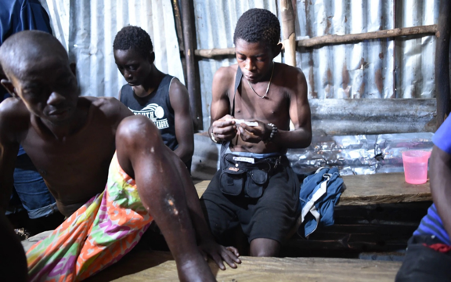By Andrew Keili
When you have 32 young people buried in a mass grave, having died from abuse of a particular drug and 63% of patients admitted to a psychiatric hospital because of that same drug, and when you walk down the streets and see youths crouched in corners as if in a daze, you can’t help but feel we have a national disaster on our hands. Nobody needs to be reminded about the devastation caused by the Kush epidemic, dominating most national discussions.
With additives comprising several chemicals, including formalin, a toxic chemical commonly used to preserve bodies, Kush is potent and dangerous but easily accessible and cheap. The drugs are shipped from overseas and mixed in makeshift labs throughout the country. Not much is known about the sources of supply, but it is suspected that many small-time dealers may also be working for people with strong connections in the political and security spheres.
There are many compelling reasons why the government should redouble its efforts to tackle this menace as it threatens to derail its well-laid-out programmes, especially those related to youth. Here is how it affects these programmes:
1. Health sector
The Kush problem threatens to overburden the health sector. Kush addicts have severe health problems. They start to forego basic hygiene. Their immune systems become weakened. Sores fester, and many complain of severe swelling in the feet and lower legs. The drug also causes liver, kidney and respiratory problems. Impaired cognitive functions and mental health disorders are standard. They overburden the hospital system. Sierra Leone also has minimal capacity for drug treatment and rehabilitation.
2. Educational sector
Many people with an addiction in school become school dropouts. Many of our school environments have places where drugs and alcohol are sold in public, enticing students to participate in taking drugs.
3. The Big Five
The consumption of illicit drugs is likely to undermine this government’s agenda. The priority “Feed Salone Programme” may be left behind in the workforce. The drug pandemic makes nonsense of “Human capital development” aimed at delivering inclusive skills and a healthy population. The “Youth employment scheme” catalysing social, democratic, economic and national security will also be jeopardised.
4. Work productivity
Those with jobs stop turning up to work. Many turn to theft to fund their habit.
5. The security sector
We have witnessed several instances in which even members of our security forces have been caught in a state of drug stupor. Kush is compromising our national security.
6. Social and behavioral issues
Drug abuse places a significant financial burden on individuals, families, and society. Kush addicts have become a social and community menace. They leave many areas unkempt and may even raid cemeteries. There are widespread rumours that some producers add ground-up human bones to the Kush concoction, hence the raiding of cemeteries.
The government has taken some measures in the past. At the tail end of 2022, the ONS led a working group comprising representatives from various institutions, civil society, and international organisations to devise practical measures to address the drug menace. Under the auspices of the Transnational Organised Crime Unit (TOCU) and SLP, the security sector mounted sustained intelligence-led operations to crack down on drug cartels and kingpins across the country. The government’s security apparatus is no doubt attempting to hone in on the problem.
Recently, the government has commissioned a rehabilitation centre. Various community groups have also launched a raft of initiatives, mainly targeting drug addicts and meted out subjective unilateral punishments. MPs have also taken the matter seriously, and the Speaker of Parliament has called for pursuing those at the top of the supply chain hierarchy. The public has got in on the act, and accusing fingers have been pointed at suspected drug kingpins.
Meanwhile, the body that officially handles such issues, the National Drug Law Enforcement Agency (NDLEA), remains severely underfunded and lacking in capacity. The Agency has responsibility for, amongst other functions, providing leadership in and coordinating all issues relating to drug control, eradicating drug abuse and effectively implementing the national drug control strategy. The National Drug Control (arrest and Seizure) Regulations, 2021, give it extra powers of arrest, entry and seizure. However, the Agency’s annual operational budget is a laughable $100,000 (assuming it is even provided). Despite such enormous powers, it can do little to dent the situation.
Considering how this menace can thwart its overall programme, the government requires greater political will to address this problem at all costs. The response to the Kush crisis appears to be lukewarm and poorly coordinated. Despite the current budgetary limitations, the government should signal its seriousness in addressing this problem and commit human and financial resources to address it. Some have even called on the President to declare a Public Health Emergency, as was recently done by President Boakei in Liberia. It is obvious that a more significant political will needs to be manifested and efforts funded by the government to avert a more substantial crisis that may be looming.
The Kush problem is a national crisis that must be tackled more seriously now!
Ponder my thoughts.
